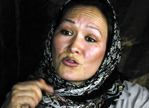 After facing suspicion from local men, Azra Jafari is now referred to as ‘Mr Mayor’ “ a title that conveys respect in Afghanistan. When Azra Jafari became mayor of Nili, she knew that the impoverished and remote Afghan town desperately needed roads and investment. She was aware she would be living in very basic conditions, on a meagre salary of $76 (£50) a month, and that taking care of a four-year-old daughter at the same time would be challenging. What she was less prepared for was the appearance of a powerful cleric in her makeshift office, wagging his finger at her, warning that Nili was not about to accept a female mayor who thought she could “exploit her femininity in order to complete a few projects and influence our women”. “After three months, the same man came up to me and thanked me,” Jafari recalled, four years later. “He said, ‘If a man could do just half of what you’ve done here, our province will surely flourish.’ He now supports me and we work very well together “ I have a great deal of respect for him.” She is now referred to as “Mr Mayor” by her community, a title that conveys respect in a country not known for women’s rights. Until 2009, Nili, a small town of about 40,000 people at the centre of Daykundi province had never seen a woman official, said Jafari. She had to prove to the community that she was serious about improving their lives. Jafari, who is married to an Afghan film-maker, is currently the subject of a documentary series called Kabul: “A City at Work”, a sequel to Kabul at Work, which seeks to show ordinary working Afghans doing extraordinary things at a time of war. Like thousands of Afghans, Jafari fled the civil war in the early 1990s, taking refuge in Iran, where she ran a school for Afghan refugee children. She moved back to Afghanistan in September 2001 to take part in a peace jirga (a tribal assembly of elders) as the fall of the Taliban became imminent.
After facing suspicion from local men, Azra Jafari is now referred to as ‘Mr Mayor’ “ a title that conveys respect in Afghanistan. When Azra Jafari became mayor of Nili, she knew that the impoverished and remote Afghan town desperately needed roads and investment. She was aware she would be living in very basic conditions, on a meagre salary of $76 (£50) a month, and that taking care of a four-year-old daughter at the same time would be challenging. What she was less prepared for was the appearance of a powerful cleric in her makeshift office, wagging his finger at her, warning that Nili was not about to accept a female mayor who thought she could “exploit her femininity in order to complete a few projects and influence our women”. “After three months, the same man came up to me and thanked me,” Jafari recalled, four years later. “He said, ‘If a man could do just half of what you’ve done here, our province will surely flourish.’ He now supports me and we work very well together “ I have a great deal of respect for him.” She is now referred to as “Mr Mayor” by her community, a title that conveys respect in a country not known for women’s rights. Until 2009, Nili, a small town of about 40,000 people at the centre of Daykundi province had never seen a woman official, said Jafari. She had to prove to the community that she was serious about improving their lives. Jafari, who is married to an Afghan film-maker, is currently the subject of a documentary series called Kabul: “A City at Work”, a sequel to Kabul at Work, which seeks to show ordinary working Afghans doing extraordinary things at a time of war. Like thousands of Afghans, Jafari fled the civil war in the early 1990s, taking refuge in Iran, where she ran a school for Afghan refugee children. She moved back to Afghanistan in September 2001 to take part in a peace jirga (a tribal assembly of elders) as the fall of the Taliban became imminent.
(Reported by Golnar Motevalli for Guardian) Photo Credit: guardian.co.uk
AUTHOR: Islamic Voice
Islamic Voice is a monthly Islamic magazine published in Bangalore. It is the largest English language Muslim publication in India. It is a comprehensive magazine, places a relatively high emphasis on social issues and strives to have a broad appeal. Since 1987, Islamic Voice has covered its fascinating namesake without fear or favour, with insight, accuracy, thoroughness and a well rounded perspective on a variety of subjects - be it the economy, politics, lifestyle, the arts, entertainment, travel, science, technology or health. That's why Islamic Voice is the country's most widely read publication, a position it has held for more than a decade. And that's why it makes sense to subscribe to Islamic Voice.
We represents all Muslim sects and shades of thought from all over India. We focus on "our" triumphs which, mostly, go unreported as well as constructively addresses our failures and shortcomings.
Editor-in-Chief: A.W. Sadatullah Khan
Genre: Current Affairs associated with Muslims
Subjects Covered:
Human Rights I Analysis I Special Reports I Issues I Book Reviews I National I International I Newsmakers I Community News I Islamic Perspectives I Classifieds I Opinions
Focus articles on:
Education and Children I Inter-faith Relations I Matrimony I Muslim economy I Muslim Perspective I The Muslim world I Society I Travel I The Western viewpoint I Women in Islam
Special focus on Faith and Law:
Fiqh I Hadith I Quran

COMMENTS